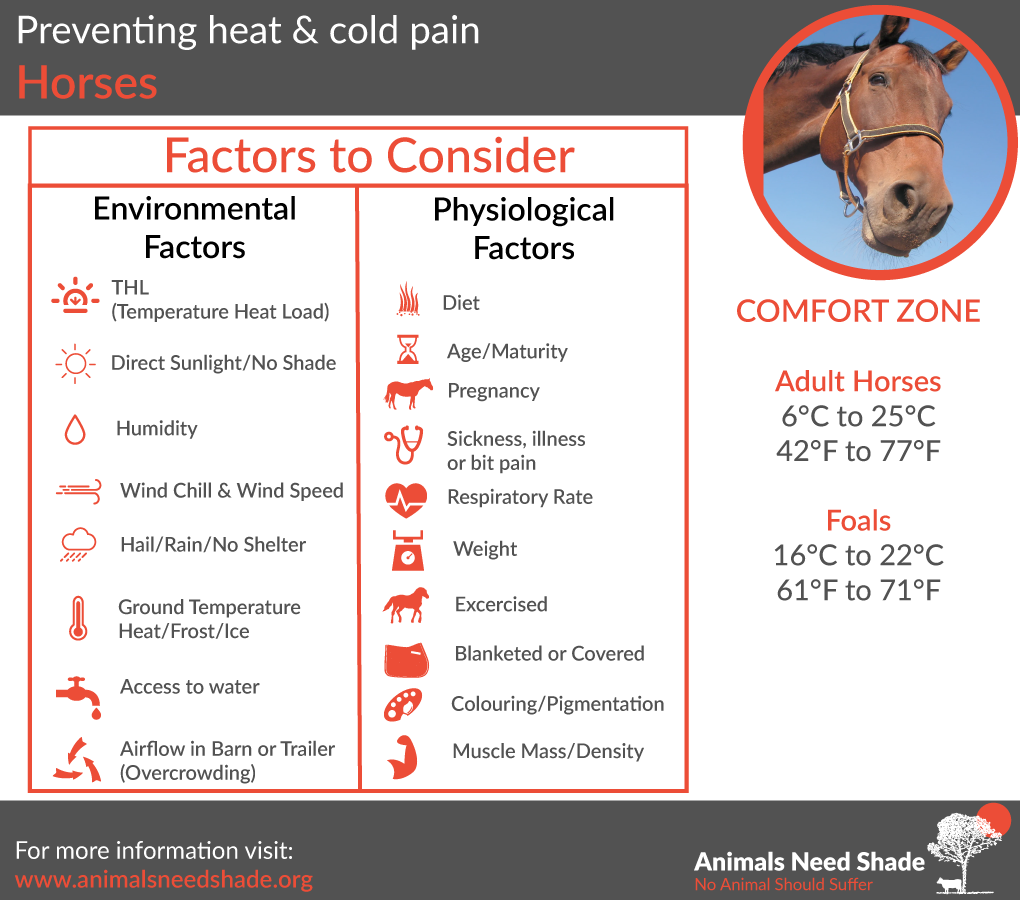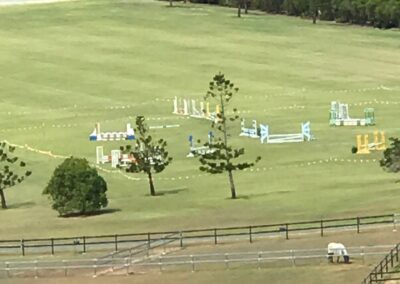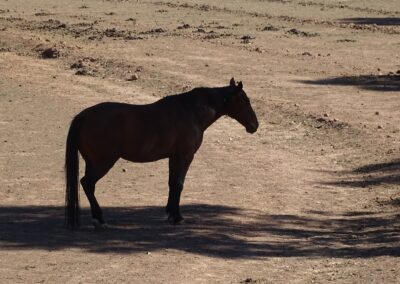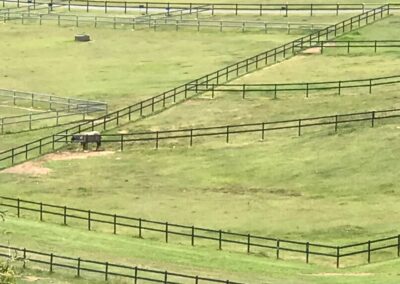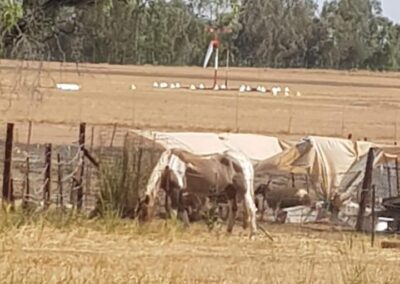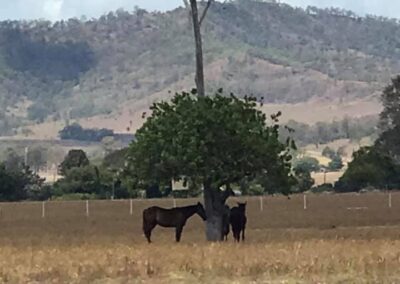Effects on Animals
HORSESCruelty and neglect of horses globally is an animal welfare crisis.
The Australian climate can often include extreme seasonal temperature variations with hot, sunny days commonplace during the summer. Climate change is expected to increase the number and temperatures of such periods and will bring about a range of stressors to horses kept in outdoor conditions or confined to stalls (Hristove et al 2017).
In Australia, horses, ponies and donkeys are usually kept in outdoor paddocks without stabling or provision of stalls. Many are seen kept in paddocks without trees or other provisions of shade. Whilst equines are able to tolerate a wide range of temperatures, they need to be protected from extreme environmental conditions. This applies in particular to foals and old, frail or sick horses. There is only limited information in the literature on the optimal temperatures and environmental conditions that equines are able to tolerate. We can, however, provide guidelines to protect these animals from unnecessary suffering based on studies that have investigated horses’ physical and physiological responses to very hot and sunny conditions.
What are some of the effects of prolonged exposure outside of a Horses comfort zone?
- Organ Failure
- Sudden & Painful Death
- Compromised Immune System
- Respiratory Disease
- Fetal fatality, embryo development
Australian Equine Unification Scheme (AEUS)
If you live in Australia, we recommend joining the AEUS Facebook Page – https://www.facebook.com/groups/australianequineunificationscheme/
The AEUS is focused on the collection of incident reports relating to animal cruelty towards horses (including NO SHADE SHELTER), if you have reports of animal cruelty, the AEUS encourage you to report this to your local RSPCA or to the police. Please request a Case number – See our reports page for more information
You can then forward the case number as part of your original report, which should include photos onto the AEUS – Download the Australian Equine Unification Scheme Horse Report Form for incidents of abuse which includes NO SHADE SHELTER. Please click this link AEUS Incident Report Form – Nov 2019.docx
The AEUS requests people provide reports for investigation to enable us to substantiate to Government and Animal Welfare agencies there are systematic cruelty issues in the Australian Horse Industry. The AEUS will use the content of the reports for media if it is deemed to aid and further the cause of exposing issues in the Australian Horse Industry. No personal information will be given out unless prior permission has been given. The AEUS respects your privacy and will ask you for permission before providing your contact details to relevant agencies.
The AEUS DOES NOT have any extraordinary legal or other power to act directly on what is reported.
If you continue to see horses suffering without shade or shelter Animals Need Shade recommends you contact your legal animal office in your respective country.
All countries have different laws. In each of these countries millions of horses continue to suffer without the most basic of necessities in the climate crisis – WITH NO shade shelter
ANIMAL LAWYERS
Horses and ‘Rugging’. A major animal welfare issue
Rugs cannot replace shade and shelter and should never be used as a substitute.
The incorrect use and over rugging of horses in spring/summer is a major problem in Australia and other countries where lack of education or neglect sees a growing number of horses suffering from heat pain/cold pain.
“Using rugs on horses in summer can be a welfare issue. Rugs do not keep horses cool. A horse naturally has a sleek coat which reflects the sun and a horse will seek shade when they are hot as a natural response. All large bodied animals, such as horses, take longer to cool down (and warm up) than smaller bodied animals. Rugs prevent any cooling breeze from cooling the body. Also horses are one of the few animals that rely on sweating to cool down and rugs impede this process (by preventing air from passing over the body, evaporating the sweat and cooling the body).
Many people rug horses in summer in order to prevent their coat from fading in the sun. If horses have access to shade they will utilise it in the heat of the day. If this is an issue for you confine your horse to shade through the day (in hot weather) with access to hay and turn them out at night. This is especially important for horses that have white skin over areas such as the nostrils and therefore get sunburned easily. It will also reduce the problem of insects for your horse because insects are not as problematic in shade and at night”
The RSPCA recommends the following in relation to RUGGING in WINTER
“Older domestic horses may therefore need extra warmth in cold wet weather but healthy younger horses do not usually need to be rugged especially if they have access to shelter (which all horses should have).
However some breeds of horses have a very fine skin and coat (such as Thoroughbreds and Standardbreds). This means that they feel the wet and cold more than tougher, hardier breeds of horse. There are always exceptions though so treat each horse individually.
Source: https://kb.rspca.org.au/knowledge-base/do-i-need-to-rug-my-horse/
A recent scientific study into the benefits / damages of rugging your horse found that owners may well be rugging their horses when it is not necessary and may be compromising their welfare as a result.
“The researchers concluded that some types of rugs can significantly increase horse surface temperature beyond those that are comfortable for the horse and could therefore compromise the horses’ capacity to regulate its own temperature. While the use of rugs and blankets may be necessary for some horses, selecting the right type and weight of rug for each horse and its individual conditions is vital. Appropriate use and application must be seriously considered to ensure they do not impact on horse welfare.”
Source: https://www.horsetalk.co.nz/2018/11/13/blanket-rule-rugging-horse/
How Do Horse’s Cool Their Body?
- Seeking shelter from direct sunlight.
- Sweating, which increases the respiratory rate as a result of dilated blood vessels. Horse covers interfere with this natural process preventing air from passing over the body, evaporating the sweat and cooling the body.
- Drinking more water/bathing in water
- The horse lowers its metabolism and will eat less so less internal heat is produced.
Health Issues From Overrugging?
If a rugged horse is sweating and overheats, it can lead to many health issues:
- Thyroid gland function can be reduced which leads to a horse unable to control its own body temperature
- Damage to body cells and tissues
- Can affect Immune system function
- Decrease growth and healing
- Electrolyte level imbalances
- Issues with sperm, embryo development and lactation in breeding horses
- Promotes obesity or other metabolic issues, in particular if grain based feeds are fed for calories due to the cold weather
“We rug Shetlands in winter, thoroughbreds in summer whatever the weather, making their lives a misery and all too often leading to an early death through debilitating diseases such as laminitis. Collectively we have to ask why we find ourselves still sleep-walking down this road.”
Source: https://www.horseandhound.co.uk/news/warning-well-meaning-owners-make-horses-lives-misery-638892
Take Action
How can you help?
Sign a Petition
Join the thousands of voices around the world campaigning for better conditions for animals
Make a Report
Report incidents of animal cruelty or abuse to local authorities or support groups
Write a Letter
Advice on how to write and engage with your local government or representatives
Shade Solutions
Do you have farm animals? Learn how to protect their health with shade

